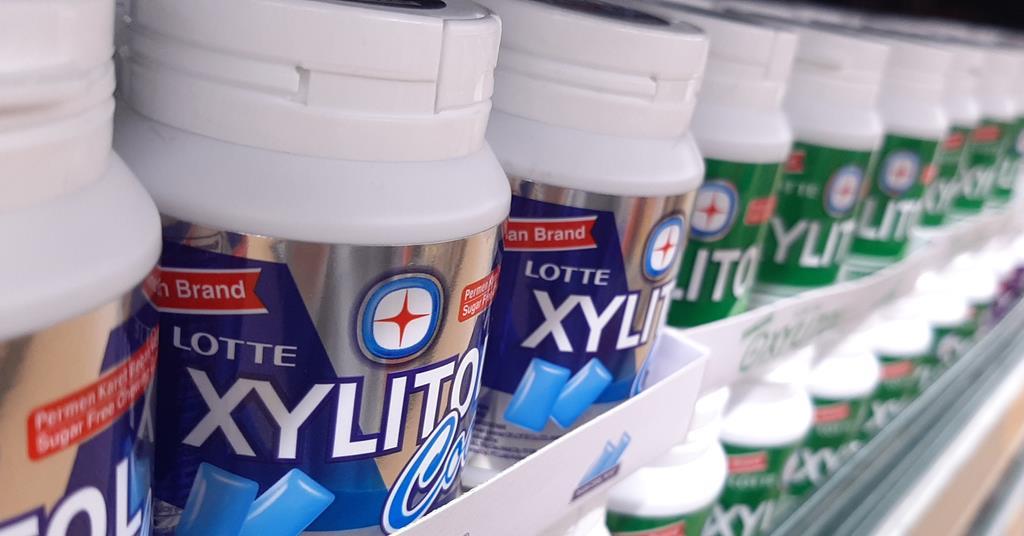Fitness
Xylitol latest sugar alcohol to be linked to heart attacks and strokes

The low-calorie sweetener xylitol, a five-carbon sugar alcohol, has been linked with a risk of major adverse cardiovascular events such as heart attack and stroke. The researchers, who are based at the Cleveland Clinic in Ohio, US, say that further studies examining the cardiovascular safety of xylitol are ‘warranted’.
Xylitol is produced at low levels in the body as a side product of glucose metabolism. However, in recent years it has been increasingly used as a replacement for sucrose in patients with diabetes and can be found in sweets, chewing gum and oral care products.
Last year, scientists at the Cleveland Clinic linked another sugar alcohol, erythritol, to heart problems. This, and other links between sweeteners and heart problems, led them to wonder whether the structurally similar sugar alcohol xylitol could cause similar cardiovascular issues.
The researchers initially measured the levels of xylitol in blood plasma samples collected between 2001 and 2007 from two independent cohorts comprising over 3000 participants who had fasted overnight. They found that a third of those who had the highest levels of circulating xylitol were more likely to experience a cardiovascular event, such as a heart attack or stroke. The researchers noted that these samples largely pre-dated recent increases in xylitol in processed foods, meaning the levels likely reflected endogenous xylitol production.
To investigate how xylitol may cause these effects they then carried out a series of functional studies in which they examined the effect of xylitol on human whole blood, platelet-rich plasma and isolated platelets in vitro, as well as an in vivo murine arterial injury model.
‘When we measured xylitol in an independent cohort of several 1000 people, we could see that circulating levels predicted future risk for heart attack, stroke and death,’ explains Stanley Hazen, who headed up the team at the Lerner Research Institute at the Cleveland Clinic. ‘So then we went through … a series of studies, both in vitro and animal models, and saw that xylitol fosters platelets to become much more hyperresponsive and prone to clots.’
Elevated platelet activity
To further assess the effects of xylitol consumption on platelet function the researchers then gave drinks sweetened with 30g of xylitol – comparable with a pint of xylitol-sweetened ice cream – to 10 healthy volunteers. They then compared platelet activity in baseline samples to samples taken 30 minutes after the drink was consumed and found that every measure of platelet clotting significantly increased after ingestion.
In the body, platelets cluster together at the site of an injury to prevent and stop bleeding, but they can also clot inside blood vessels, compromising the blood supply to the heart and brain and raising the risk of a heart attack or stroke.
‘All of the volunteers were healthy and started with [platelet function] levels that were in the bottom 25% of our population, and we saw that every single measure of platelet functional responsiveness enhanced dramatically in the post-prandial sample,’ says Hazen. ‘It was seen in every individual subject with every measure at every concentration that we looked at – so it’s quite significant even though it’s a small pilot study .’
Hazen told Chemistry World that the long-term goal of his team was to discover new pathways linked to heart disease. ‘The sugar alcohols, starting with erythritol, are linked to cardiovascular disease,’ he says. ‘Just like cholesterol [which] is an endogenous metabolite that we both synthesise and ingest in our diet and is linked to the development of cardiovascular disease, so too erythritol and xylitol are endogenous metabolites and in the last decade or two, have become something that we ingest in much, much higher levels.’
Missing information
Duane Mellor, a registered dietician and associate dean at Aston University in the UK, says the study is noteworthy but adds that there is some important information missing. ‘It’s an interesting one because it looks at what happens if you put it in a drink, and the response of that, and it looks at levels in plasma, but it doesn’t actually tell you if people are consuming xylitol in their diet.’
‘Xylitol has a pathway where it can be synthesised in the human body … we had a similar paper to this with erythritol a few months ago, which again can be synthesised in the human body … so it could be that we just get more xylitol made in bodies at higher risk – there’s nothing to test that.’
Mellor says ideally the study should have factored in the participants’ dietary intake. ‘Then you look at whether it is the xylitol in the diet that’s a problem.’
Tracy Parker, senior dietitian at the British Heart Foundation, says the study adds to a ‘constantly growing base’ of evidence about how zero-calorie sweeteners could affect our health. ‘While not yet definitive, the results highlight the importance of investment into further research, to ensure these additions to our food are not contributing to an increased risk of devastating cardiovascular events.’
‘It’s important to note this research is not a green light to have more sugar instead. We all need to reduce our intake of the processed foods and beverages that contain high levels of sugars, sweeteners and salt,’ Parker adds. ‘This is the best way of ensuring a healthy diet and a lowered risk of heart and circulatory disease.’



)






